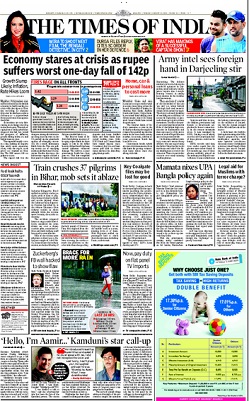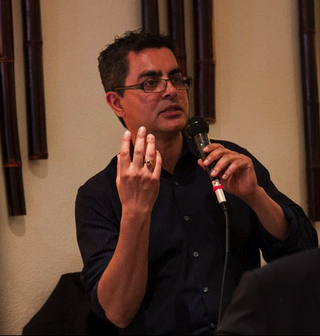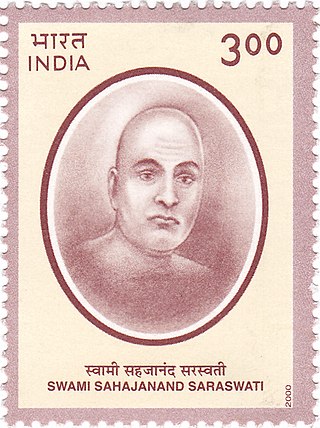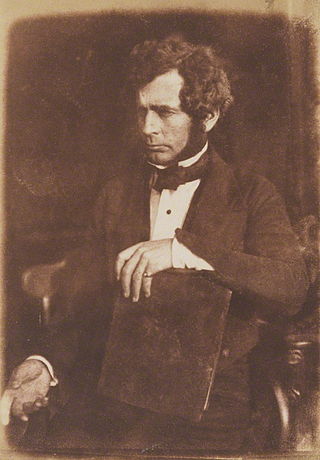
The Times of India, also known by its abbreviation TOI, is an Indian English-language daily newspaper and digital news media owned and managed by The Times Group. It is the fourth-largest newspaper in India by circulation and largest selling English-language daily in the world. It is the oldest English-language newspaper in India, and the second-oldest Indian newspaper still in circulation, with its first edition published in 1838. It is nicknamed as "The Old Lady of Bori Bunder", and is a "newspaper of record".
Khalid Mohamed is an Indian journalist, editor, film critic, screenwriter and film director. He worked for The Times of India for 27 years and then DNA followed by Hindustan Times and was the lead editor for Filmfare magazine. He is the son of Zubeida Begum, on whose life he wrote the screenplay of Shyam Benegal's 2001 film, Zubeidaa.

Rajendra Prasad was an Indian politician, lawyer, journalist and scholar who served as the first president of India from 1952 to 1962. He joined the Indian National Congress during the Indian independence movement and became a major leader from the region of Bihar. A supporter of Mahatma Gandhi, Prasad was imprisoned by British authorities during the Salt Satyagraha of 1930 and the Quit India movement of 1942. After the constituent assembly 1946 elections, Prasad served as 1st Minister of Food and Agriculture in the central government from 1947 to 1948. Upon independence in 1947, Prasad was elected as President of the Constituent Assembly of India, which prepared the Constitution of India and which served as its provisional Parliament.

Amitava Kumar is an Indian writer and journalist who is Professor of English, holding the Helen D. Lockwood Chair at Vassar College.

Sahajanand Saraswati was an ascetic, a nationalist and a peasant leader of India. Although born in United Provinces, his social and political activities focussed mostly on Bihar in the initial days, and gradually spread to the rest of India with the formation of the All India Kisan Sabha. He had set up an ashram at Bihta, near Patna, Bihar carried out most of his work in the later part of his life from there. He was an intellectual, prolific writer, social reformer and revolutionary.
Raj Kamal Jha is an Indian newspaper editor and novelist writing in English. He currently serves as the Editor-in-Chief of The Indian Express. He has written six novels that have been translated into more than 12 languages. His journalism and fiction have won national and international awards, including the Commonwealth Writers Prize; Rabindranath Tagore Literary Prize; Tata Literature Live! Book of The Year; the International Press Institute India Award for Excellence in Journalism; and the Mumbai Press Club Journalist of the Year award. In September 2021, Jha was awarded Editor of The Year by the India Chapter of the International Advertising Association Annual Leadership Awards.
Dilip Purushottam Chitre was one of the foremost Indian poets and critics to emerge in the post Independence India. Apart from being a notable bilingual writer, writing in Marathi and English, he was also a teacher, a painter, a filmmaker and a magazine columnist.
Indian English literature (IEL), also referred to as Indian Writing in English (IWE), is the body of work by writers in India who write in the English language but whose native or co-native language could be one of the numerous languages of India. Its early history began with the works of Henry Louis Vivian Derozio and Michael Madhusudan Dutt followed by Rabindranath Tagore and Sri Aurobindo. R. K. Narayan, Mulk Raj Anand and Raja Rao contributed to the growth and popularity of Indian English fiction in the 1930s. It is also associated, in some cases, with the works of members of the Indian diaspora who subsequently compose works in English.
Indian English poetry is the oldest form of Indian English literature. Henry Louis Vivian Derozio is considered the first poet in the lineage of Indian English poetry followed by Rabindranath Tagore, Sri Aurobindo, Sarojini Naidu, Michael Madhusudan Dutt, and Toru Dutt, among others.

Arvind Panagariya is an Indian economist who is also holding the position of Jagdish Bhagwati, the Director of Deepak and Neera Raj Center on Indian Economic Policies at School of International and Public Affairs at Columbia University in New York City. He served as first vice-chairman of the government of India think-tank NITI Aayog between January 2015 and August 2017. He has been appointed as the chairman of 16th Finance Commission by the government of India. He is a former Chief Economist of the Asian Development Bank. He was awarded the Padma Bhushan by the President of India in 2012 for his contributions in the field of economics and Public Policy.

Mangesh Keshav Padgaoankar was a legendary Marathi poet from Maharashtra, India.

Thayil Jacob Sony George is an Indian writer and biographer who received a Padma Bhushan award in 2011 in the field of literature and education. The fourth of eight siblings, TJS was born in Kerala, India to Thayil Thomas Jacob, a magistrate, and Chachiamma Jacob, a homemaker. Although his roots are in Thumpamon, Kerala, he lives in Bangalore and Coimbatore with his wife Ammu. He has a daughter, Sheba Thayil and a son, Jeet Thayil. American TV journalist Raj Mathai is his nephew.
Groom kidnapping, colloquially known as Pakaruah shaadi or Jabaria shaadi, is a phenomenon in the western parts of Bihar and eastern Uttar Pradesh states, more prominent in Munger and Dumka wherein eligible bachelors are abducted by the bride's family and later forcibly married, to get men with better education and/or richer men. Considering the traditional regard for the marriage sacrament, most such marriages are not annulled. Additionally, the groom may suffer fake criminal charges under Indian dowry law, and end up fighting lengthy legal battles.

Pandit Nilakantha Das (1884-1967) was one of the most illustrious sons of Odisha, who appeared both in its political and literary arena at the most crucial period of its history, when Odisha had no political identity in the map of India, and Odia as a language was about to be extinct. He worked relentlessly for Odisha's recognition both politically and linguistically, and helped bring to fruition the dreams of Utkala Gaurab Madhusudan Das, Utkalamani Gopabandhu Das and all other Odia loving people.

Badri Narain Sinha was born at village Saramohanpur in Darbhanga district of Bihar. An officer of Indian Police Service of 1952 batch of Bihar cadre of India, Sinha died in harness as Deputy Inspector General (CID), Government of Bihar. Sinha, described as ‘erudite and knowledgeable police chief’ by noted sociologist-journalist Arvind N Das, was a poet, critic, journalist, and a close associate of Jayprakash Narayan. Apart from the unique alchemy of brain and brawn that he displayed as an administrator and police officer, he was a thinker, littérateur, poet, a secular devout who broke bread with Muslims during the holy month of Ramzan as much as practicing austere Hindu fast during the whole month of Kartik, personifying in his life the multi-faceted moral actions that he highlights as Gandhi's character and, therefore, his message in his writings on the Mahatma.

George Buist FRSE FRS FRSSA FGS LL.D. (1805–1860) was a Scottish journalist and scientist. He was the editor of The Bombay Times and Journal of Commerce which his successor Robert Knight renamed The Times of India. He is described "as India's foremost man of letters".

Punya Prasun Bajpai is an Indian journalist. He has worked at several news networks in his career, including Aaj Tak, where he hosted the weekday show known as 10 तक, and ABP News, where he hosted Masterstroke for four months in 2018.
Ayi Ganpat Tendulkar (1904–1975) was an Indian screenwriter, journalist and actor. He is especially known as the husband of Thea von Harbou, the writer of the science fiction film classic Metropolis.
Editors Guild of India (EGI) is a non-profit organisation of journalists, particularly the Editors, based in India. The organization has declared "objectives of protecting press freedom and for raising the standards of editorial leadership of newspapers and magazines". It was founded in 1978, by Kuldip Nayar. EGI has represented Indian newspapers in communications to the government.
Dileep Padgaonkar was the Editor of The Times of India. He was Editor from 1986 to 1994. He was awarded the Légion d'honneur in 2002 for his contribution to Journalism.